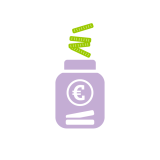Take care of your partner in the event of your death | Questions and answers
If you’re like Karin: below the age of 55 with a pension previously accrued with Philips Pensioenfonds
- Personal pension capital: Karin will keep the pension that she’s accrued, and its value will become her personal pension capital when we switch to the new pension plan. If Philips Pensioenfonds’s finances are healthy, her personal pension capital will be topped up from the Pension Fund’s financial buffer so her projected pension will go up a little right away. This is good news for members like Karin.
- Investment risks: Karin’s pension capital will be invested according to her age. She’s not accruing a pension with us anymore, so no new contributions will be added. Karin’s retirement is still a long way off, so we’ll take relatively high risks with her investments. For her generation, this often means that their projected pension will be higher than under the existing pension plan. However, Karin shouldn’t make any assumptions. If the economy goes badly, she might have quite a bit less pension - perhaps even less than under the existing pension plan. Until she retires, no protections are in place to prevent her pension from losing value, so it’s important for Karin to keep an eye on how her pension is doing.
- No choices, no compensation: Karin isn’t accruing a pension with Philips Pensioenfonds anymore, so she won’t be compensated for the new accrual method. She might be entitled to compensation from her new employer’s pension administrator though. Karin doesn’t have any options to choose between now and her retirement. Her pension will stay in our Pension Fund, and we’ll invest it with the exact same care as we give all our other members’ pensions.

Take care of your partner in the event of your death
- Do you currently have a survivor’s pension with Philips Pensioenfonds? Your partner and children will receive a pension from Philips Pensioenfonds in the new pension scheme, in the event of your death.
- The survivor's and orphan's pension that you have accrued with us on 1 January 2027 will continue to exist. Your partner and children will receive this in the event of your death before your retirement date.
- Are you retiring? Then you choose how much survivor's pension you want for your (possible) partner and children in the event of your death after your retirement. This is financed from your personal pension capital.

Questions & answers
for members below the age of 55 with a noncontributory pension
If a decision is made to enter (for the meaning of entry, see the answer to question 10), then non-contributory policyholders will also receive their own pension pot to which the new rules apply. The pension (capital) will therefore move more along with the economy for non-contributory policyholders.
The pensions of pension beneficiaries, active members and non-contributory policyholders that have already been accrued at the time of the transition to the new system will be converted to the new pension scheme. In pension jargon, we then speak of 'itransferring' ('invaren').
The decision of the pension fund board to transfer is binding for all participants of the fund. There is no individual right of objection. However, the Accountability Body must give advice on transferring.
No, there are legal calculation rules for the distribution of the pension assets upon commencement. One of the conditions is that participants receive at least the value of the accrued pensions paid into their pension pot, provided that the funding ratio of the Fund is sufficient (more than 102%). An other question explains how the Fund's buffer is subsequently distributed upon entry.
Under the new pension system you will still have the right to ‘value transfer’, i.e. the right to take your pension capital with you if you move to another employer. Because you will accrue a personal pension capital, that means that your own pension savings will go with you to your new employer’s pension administrator, which will then start investing those savings for you.
That is correct. Under the new system, you will have a personal pension capital that is invested. The value of your pension capital will fluctuate over time. You will be able to see how much pension capital you have at a particular moment. You will also be able to see what developments have affected it, either increasing its value (contributions and investment gains, for example) or decreasing its value (such as benefits that you have drawn or investment losses).
How much pension you can draw from your pension capital after you retire will not be predetermined: instead, it will depend on factors such as future investment yields and the interest rates when you retire. Those yields will depend on your age: while you are young, more of your pension capital will be invested in equities (shares) and its value will fluctuate more strongly than when you are older and it is invested more conservatively.
When the new system is introduced, your pension will also be affected more strongly by economic fluctuations: it will be more likely to go up in times of prosperity, but also more likely to go down when the economy is struggling. We will try to prevent a decrease in pension benefits as much as possible.
With regard to the increase in your pension: in the current pension system, this is always done through indexation. In new pension system your pension will not be indexed in the way that it is now. Whether your pension goes up depends on the amount of your personal pension assets. And also besides the investment return, the projection return will be determining the yearly adjustment of the benefit. More information about the projection return can be found on our Question and Answers page under the question: 'Is the calculation interest rate in the new pension system no longer important at all?'.
Related information
The information below might also be interesting for you

New rules for pensions
On this central page you will find information about what you can expect in the years to come.
New pension rules
Want to know more about the survivor’s pension?
Check out our survivor’s pension theme page.
Go to survivor's pension